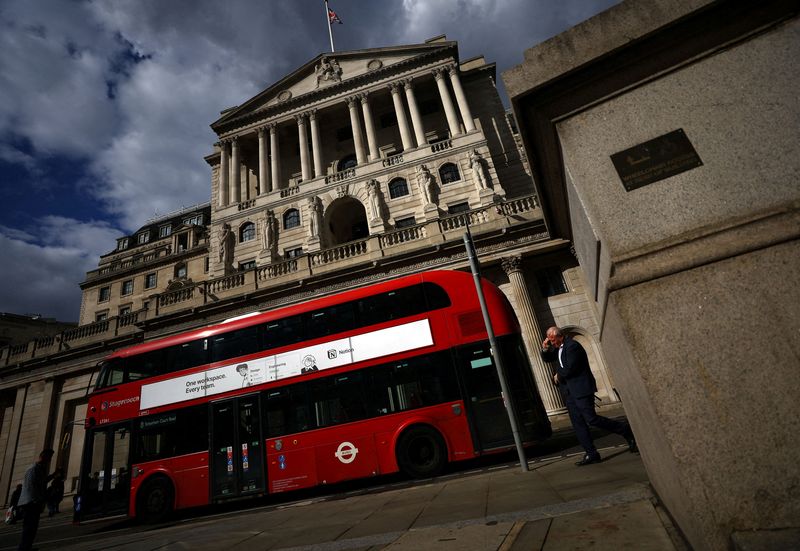By Shaloo Shrivastava
BENGALURU (Reuters) - The Bank of England will start cutting interest rates in the third quarter, a Reuters poll of economists showed, with a slim majority expecting the first reduction in August.
That is later than forecast in a January poll, when a small majority of economists saw the rate cut cycle starting next quarter, although the latest result also was a very close call.
Reuters surveys since August have consistently predicted the first 2024 cut would come in Q3, except last month's poll that predicted Q2.
An August rate cut would mean the BoE will lag the U.S. Federal Reserve and European Central Bank, which are expected to start lowering borrowing costs next quarter, according to separate Reuters polls.
A raft of stronger than expected UK economic data and comments from several Monetary Policy Committee members, who said they needed more evidence of fading price pressures, prompted some economists to lean towards a Q3 cut.
Inflation remained steady at 4.0% in January, unchanged from December but much lower than the 41-year high of 11.1% in October 2022.
The BoE raised interest rates 14 times from December 2021 to August 2023 to calm inflation, taking Bank Rate to a 15-year peak of 5.25%.
Britain's economy has been grappling with high inflation and borrowing costs, and entered a shallow recession in the second half of 2023.
But some MPC members were less worried about recession as the economy showed signs of picking up, and said they were in no rush to loosen policy.
Median forecasts in the Feb. 15-20 poll of 66 economists showed Bank Rate will stay at 5.25% until a fall to 4.75% in the third quarter, then ending the year at 4.50%.
"We think it will take several more months for the Monetary Policy Committee to feel confident enough in disinflation in order to cut rates. We see the first Bank Rate cut this August," said Chris Hare, senior economist at HSBC (LON:HSBA).
"While the labour market remains tight and while wage growth remains elevated, the sustainable return to 2% (inflation) is not assured."
Slightly more than half of economists forecast the first cut to come in Q3, with around 42% - 28 of 66 - predicting it would come in Q2. One said Q4 and one more expected no cuts this year.
Asked which month the BoE will start cutting, of 45 who answered, 23 said August, 11 said June, seven said May, three said September and one said February 2025.
Of 12 gilt-edged market makers who answered the question, seven said August, four said May and one said June. August was in line with market pricing.
Bets by investors on interest rate cuts in 2024 were not unreasonable, BoE Governor Andrew Bailey said on Tuesday.
However, when asked what is more likely on the timing of the first cut, economists were split. Of 36 who answered, 18 said that it would come sooner than they expect and 18 said later.
"The Bank of England is concerned that both wage growth and services inflation could be stickier and slower to come down, and that would potentially push back the timing of the first cut," said James Smith, developed markets economist at ING.
Inflation was predicted to fall sharply, averaging 3.5% this quarter, 2.0% in Q2 and 1.8% in Q3 - below the BoE's 2% target. It was seen averaging around target through 2025.
Median forecasts showed inflation averaging 2.5% this year, 2.1% next year and 2.0% in 2026.

The British economy grew only 0.1% in 2023 and is predicted to expand 0.3% this year. A bounce to 1.1% and 1.4% growth in 2025 and 2026, respectively, is expected.
(For other stories from the Reuters global economic poll:)